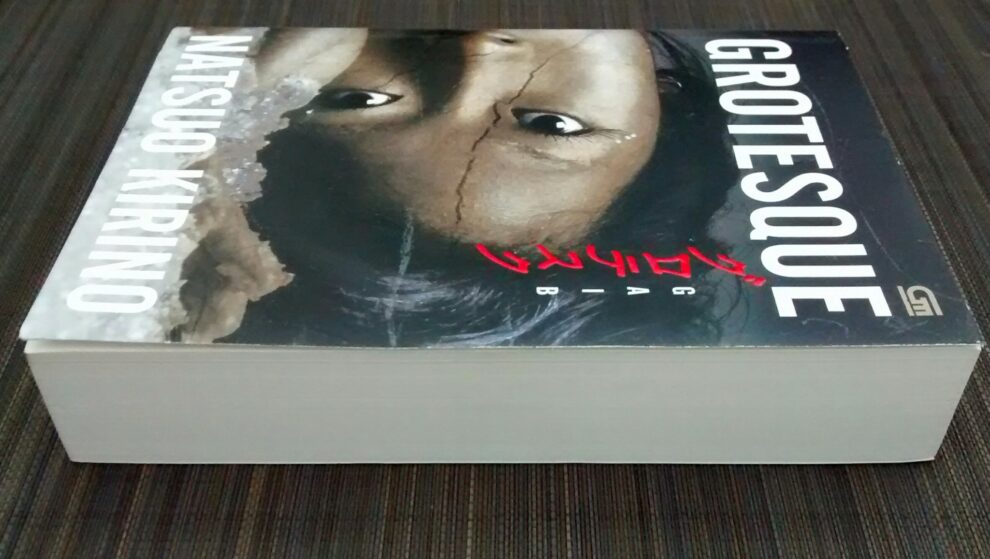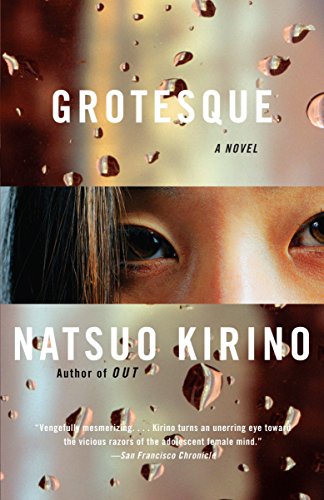by Renee Ng
It is our misfortune that a full scope of Natsuo Kirino's writing prowess cannot be realized in the English world. Of the dozens of novels she has written since the 1990s, only four have been translated to English. But of these four dark demonstrations of Japanese society and culture, “Grotesque” leaves its most daring mark on female sexuality.
The story opens with an unnamed narrator, who explains that her younger sister, Yuriko and old classmate, Kazue Sato have been murdered. Coincidentally, both women had become sex workers at some point in their lives, and on separate occasions, were strangled to death by the same customer, a man named Zhang Zhe Zhong. A natural cynic, the narrator promises to explain everything she knows to the reader and begins a long tale from her childhood. Interspersed with diaries, letters and accounts from Yuriko, Kazue and Zhang, we are introduced to an ensemble of women, each grappling with questions of physical beauty and sex as parameters of female worth and power.
Yuriko, the narrator's younger sister, is impossibly, unnervingly beautiful. Even as a child, she arouses the desire of every man, and the ire of every woman. Her own mother is at a loss at how she produced such an abnormally perfect creature. And the narrator, placed in constant comparison with Yuriko, inevitably develops a lifelong resentment for her. Their unsolicited rivalry enters the schoolyard, where Kazue Sato joins the mix. A sheltered and sensitive girl, Kazue's encounters with the narrator and Yuriko evoke her own gradual spiral into what seems a perennial societal tussle between a woman, and the world's evaluation of her body.
Is that all a woman can be? Beautiful, or not beautiful? Desirable, or not desirable? And if she is rather unattractive, could she at least be smart, or redeemed by some other way? Each character's tale of survival provides a meaty chance for Kirino to prod at this social prison, testing it for loopholes and weak spots. With little to no emotion, she reveals that no one wins. Even the seeming reclaim of one's sexuality through promiscuity and prostitution, a self-described move of subversion by the characters, subsequently still place the women at the greater mercy of others who would use them. “Grotesque” exposes, with a cold and objective eye, the social contract women sign with their birth. For a woman, vanity is not pride. It can mean an olive branch, a gift of roses, albeit with hidden thorns.

Similar to “Out” and “Real World”, the society we know in “Grotesque” is a bleak tunnel. The quietly suffocating world of prepubescent girls dangles them towards irritating etiquette, eating disorders and normalized pedophilia. In line with Kirino's professed genre: crime and mystery, the crucial draw is her ability to weave a good murder without sensationalizing the perpetrator or motive. Because not only is Kirino uninterested in answers, to live in the harsh reality of “Grotesque”, one must first understand that no person or intent is straightforward. Everyone is a nasty product of their born face, their family, the values they've been force-fed, the disgust they've nurtured with care.
Kirino's harrowing feminist expose comes at the expense of her characters' happiness, whose complex inner worlds form her visceral prose, which favors vivid but familiar language. Coursing through ugly, private thoughts of women expected to behave, readers cannot help but share a feeling of unbridled, rebellious solidarity. Yet with issue driven works, we are always reminded that closure is far from got. Across the narrator's loneliness, Yuriko's resignation, and Kazue's confusion, not once do they truly confide the core of their anguish. Another syndrome of Kirino's worlds, that her chosen subject matter is always one otherwise difficult to articulate in real life.
For Natsuo Kirino, literature might be a subversive expression, to illuminate one's struggles, desires, and bewilderment. It is unfortunately likely that “Grotesque” will continue to resonate for a long time, but at least its acknowledgements will remind women that they are absolutely far from alone.
















